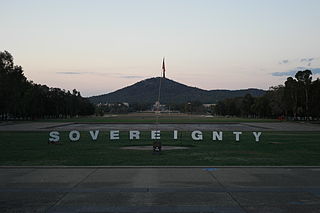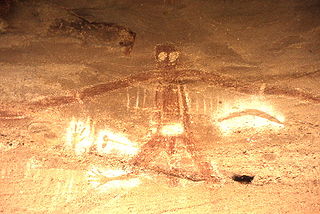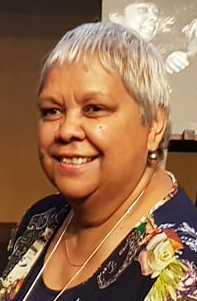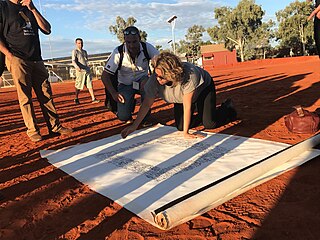Related Research Articles

Australian Indigenous sovereignty, also recently termed Blak sovereignty, encompasses the various rights claimed by Aboriginal and Torres Strait Islander peoples within Australia. Such rights are said to derive from Indigenous peoples' occupation and ownership of Australia prior to colonisation and through their continuing spiritual connection to land. Indigenous sovereignty is not recognised in the Australian Constitution or under Australian law.
Native title refers to rights, recognised by Australian law, held by Aboriginal and Torres Strait Islander groups or individuals to land that derive from their maintenance of their traditional laws and customs. These Aboriginal title rights were first recognised as a part of Australian common law with the decision of Mabo v Queensland in 1992. The doctrine was subsequently implemented and modified via statute with the Native Title Act 1993.

Galarrwuy Yunupingu, also known as James Galarrwuy Yunupingu and Dr Yunupingu, was an Indigenous Australian activist who was a leader in the Aboriginal Australian community. He was involved in Indigenous land rights throughout his career. He was a Yolngu man of the Gumatj clan, from Arnhem Land in the Northern Territory. He was the 1978 Australian of the Year.

The Government of Victoria, also referred to as the Victorian Government, is the executive branch of the Australian state of Victoria. The executive is one of three independent branches, alongside the judicial, and the legislative.

Kim Scott is an Australian novelist of Aboriginal Australian ancestry. He is a descendant of the Noongar people of Western Australia.
Indigenous Australian self-determination, also known as Aboriginal Australian self-determination, is the power relating to self-governance by Aboriginal and Torres Strait Islander peoples in Australia. It is the right of Aboriginal and Torres Strait Islander peoples to determine their own political status and pursue their own economic, social and cultural interests. Self-determination asserts that Aboriginal and Torres Strait Islander peoples should direct and implement Aboriginal and Torres Strait Islander policy formulation and provision of services. Self-determination encompasses both Aboriginal land rights and self-governance, and may also be supported by a treaty between a government and an Indigenous group in Australia.
Yamatji is a Wajarri word that has at least two different meanings:
Indigenous Australians are people with familial heritage from, and/or recognised membership of, the various ethnic groups living within the territory of present day Australia prior to British colonisation. They consist of two distinct groups, which includes many ethnic groups: the Aboriginal Australians of the mainland and many islands, including Tasmania, and the Torres Strait Islanders of the seas between Queensland and Papua New Guinea, located in Melanesia. The term Aboriginal and Torres Strait Islander peoples or the person's specific cultural group, is often preferred, though the terms First Nations of Australia, First Peoples of Australia and First Australians are also increasingly common; 812,728 people self-identified as being of Aboriginal and/or Torres Strait Islander origin in the 2021 Australian Census, representing 3.2% of the total population of Australia. Of these Indigenous Australians, 91.4% identified as Aboriginal; 4.2% identified as Torres Strait Islander; while 4.4% identified with both groups. Since 1995, the Australian Aboriginal flag and the Torres Strait Islander flag have been official flags of Australia.

An Australian Aboriginal sacred site is a place deemed significant and meaningful by Aboriginal Australians based on their beliefs. It may include any feature in the landscape, and in coastal areas, these may lie underwater. The site's status is derived from an association with some aspect of social and cultural tradition, which is related to ancestral beings, collectively known as Dreamtime, who created both physical and social aspects of the world. The site may have its access restricted based on gender, clan or other Aboriginal grouping, or other factors.

Jacqueline Gail "Jackie" Huggins is an Aboriginal Australian author, historian, academic and advocate for the rights of Indigenous Australians. She is a Bidjara/Pitjara, Birri Gubba and Juru woman from Queensland.

Kenneth George Wyatt is an Australian former politician. He was a member of the House of Representatives from 2010 to 2022, representing the Division of Hasluck for the Liberal Party. He is the first Indigenous Australian elected to the House of Representatives, the first to serve as a government minister, and the first appointed to cabinet.

Leeanne Margaret Enoch is an Australian politician currently serving as the Queensland Minister for Communities and Housing, for the Arts, and for Digital Economy. She has also served as the Labor Party member for Algester in the Queensland Legislative Assembly since 2015.

Yingiya Mark Guyula is an Australian politician and a Yolŋu man of the Djambarrpuyŋu clan and the Liya-Dhälinymirr people. He is an independent member of the Northern Territory Legislative Assembly for the seat of Mulka in north-east Arnhem Land. He previously represented Nhulunbuy from 2016 to 2020. He is the only independent Indigenous member of parliament in the Northern Territory and campaigned on a platform of self-determination for Yolŋu people.

Lidia Alma Thorpe is an Aboriginal Australian independent politician. She has been a senator for Victoria since 2020 and is the first Aboriginal senator from that state. She was a member of the Australian Greens until February 2023 when she quit the party over disagreements concerning the proposed Indigenous Voice to Parliament. She had also served as the Greens' deputy leader in the Senate from June to October 2022.

The Uluru Statement from the Heart is a 2017 petition to the people of Australia, written and endorsed by the Australian Aboriginal and Torres Strait Islander leaders selected as delegates to the First Nations National Constitutional Convention. The document calls for substantive constitutional change and structural reform through the creation of two new institutions; a constitutionally protected First Nations Voice and a Makarrata Commission, to oversee agreement-making and truth-telling between governments and First Nations. Such reforms should be implemented, it is argued, both in recognition of the continuing sovereignty of Indigenous peoples and to address structural power differences that has led to severe disparities between Indigenous and non-Indigenous Australians. These reforms can be summarised as Voice, Treaty and Truth.
The 2019 Victorian First Peoples' Assembly election was held between 16 September to 20 October 2019 to elect 21 members to the First Peoples' Assembly in the Australian state of Victoria. The election filled seats to the body, which was charged with the responsibility of preparing for negotiations with the Victorian Government about a treaty with the state's Aboriginal population.
Constitutional recognition of Indigenous Australians refers to various proposals for changes to the Australian Constitution to recognise Indigenous Australians in the document. Various proposals have been suggested to symbolically recognise the special place Indigenous Australians have as the first peoples of Australia, along with substantial changes, such as prohibitions on racial discrimination, the protection of languages and the addition of new institutions. In 2017, the Uluru Statement from the Heart was released by Indigenous leaders, which called for the establishment of an Indigenous Voice to Parliament as their preferred form of recognition. When submitted to a national referendum in 2023 by the Albanese government, the proposal was heavily defeated.

Dorinda Rose Cox is an Australian politician who has been a Senator for Western Australia since 2021, representing the Greens. A Yamatji and Noongar woman, she is the first Indigenous woman to represent Western Australia in the Senate. She was originally appointed to fill the casual vacancy caused by the resignation of Senator Rachel Siewert in 2021, and was then elected as the Greens' lead Senate candidate in Western Australia at the 2022 federal election.
Australian Indigenous advisory bodies are Aboriginal and Torres Strait Islander advisory bodies established or proposed to be established by the Commonwealth and state and territory governments. Calls for such bodies, especially for a Commonwealth level Voice to Parliament, became prominent following the release of the Uluru Statement from the Heart, however similar bodies of various levels of independence have existed since the official end of assimilationist policies in the 1970s and the promotion of self-determination and reconciliation. Such bodies generally advise governments on policies and programmes that affect Indigenous Australians, and represent Indigenous interests in public debate. Other advisory bodies have been established in the context of state treaty process, to advise governments and Indigenous groups to prepare for upcoming negotiations.
References
- ↑ Hobbs, Harry; Norman, Heidi; Walsh, Matthew (3 April 2023). "What actually is a treaty? What could it mean for Indigenous people?". The Conversation. Australia.
- 1 2 3 4 5 Seccombe, Mike (27 January 2024). "The push for treaty stalls". The Saturday Paper .
- 1 2 "Advancing the Treaty Process with Aboriginal Victorians Bill 2018". Parliament of Victoria. 7 March 2018. Retrieved 21 July 2020.
- 1 2 3 4 "Australia moves towards Aboriginal treaties". BBC News. British Broadcasting Corporation. 8 June 2018. Retrieved 14 July 2019.
- 1 2 "What will Indigenous treaties mean?". ABC News. Australian Broadcasting Corporation. 14 December 2016. Retrieved 14 July 2019.
Australia is the only Commonwealth country that does not have a treaty with its Indigenous peoples and interestingly, the states are leading the charge, the ABC's editor of Indigenous affairs says.
- ↑ Isichei, Elizabeth Allo (1983). Isichei, Peter Uche (ed.). A History of Nigeria. Vol. 2. London: Longman. p. 362. ISBN 9780582643314 . Retrieved 12 April 2021.
- 1 2 3 4 5 6 Hobbs, Harry; Williams, George (1 March 2018). "The Noongar Settlement: Australia's First Treaty". Sydney Law Review . 40 (1). Retrieved 20 July 2020– via Australasian Legal Information Institute (AustLII).
- ↑ "Order-in-Council Establishing Government 23 February 1836 (UK)". Museum of Australian Democracy. Documenting a democracy. Retrieved 16 November 2019.
- ↑ Draft of the Order-in-Council Establishing Government 23 February 1836 (UK) , National Archives of Australia
- ↑ Richard Broome, pp10-14, Aboriginal Victorians: A History Since 1800, Allen & Unwin, 2005, ISBN 1-74114-569-4, ISBN 978-1-74114-569-4
- ↑ "Governor Bourke's Proclamation 1835 (UK)". Documenting Democracy. Museum of Australian Democracy. Retrieved 20 July 2020.
- ↑ "The Batman Treaty". SBS On Demand. Special Broadcasting Corporation. Retrieved 14 July 2019.
- ↑ "Batman's treaty". Ergo. State Library of Victoria. Retrieved 15 July 2019.
- 1 2 3 "Why doesn't Australia have an indigenous treaty?". BBC News. British Broadcasting Corporation. 24 May 2017. Retrieved 14 July 2019.
- 1 2 "Indigenous Australian 'hearts broken'". BBC News. 27 October 2017. Retrieved 20 July 2020.
- ↑ "Uluru Statement from the Heart". referendumcouncil.org.au. Referendum Council. Archived from the original on 6 March 2019. Retrieved 21 July 2018.
- ↑ Pearson, Luke (10 August 2017). "What is a Makarrata? It's more than a synonym for treaty". ABC News (Radio National). Australian Broadcasting Corporation. Archived from the original on 5 June 2019. Retrieved 21 July 2020.
- 1 2 3 Wyatt, Ken. "National Press Club Address - 'Walking in Partnership to Effect Change'". Ministers Media Centre. Retrieved 21 July 2020.
- ↑ Conifer, Dan (9 July 2019). "Indigenous constitutional recognition to be put to referendum in next three years, Minister promises". ABC News. Australian Broadcasting Corporation. Retrieved 21 July 2020.
- ↑ Wyatt, Ken (10 July 2019). "Ken Wyatt speech: Indigenous Australians Minister's historic pledge for recognition". The Sydney Morning Herald. Retrieved 21 July 2020.
- ↑ Atkinson, Geraldine; Stewart, Marcus (4 June 2020). "OPINION: Blak Lives Matter - Which is why we need Treaty". NITV. Special Broadcasting Service. Retrieved 4 September 2022.
- ↑ Jakubowicz, Andrew; Payne, Anne Maree; Thomas, Archie; Norman, Heidi (11 November 2020). "The Black Lives Matter movement has provoked a cultural reckoning about how Black stories are told". The Conversation. Retrieved 4 September 2022.
- ↑ Allam, Lorena (20 August 2022). "What is an Indigenous treaty and how would it work in Australia?". The Guardian. Guardian News & Media Limited. Retrieved 4 September 2022.
- ↑ "NSW Labor commits to treaty consultations with Indigenous community if elected in March". ABC News. 21 January 2023. Retrieved 30 August 2023.
- ↑ Cross, Jarred (7 April 2023). "New NSW Minister for Aboriginal Affairs and Treaty lays out plans". National Indigenous Times. Archived from the original on 10 April 2023.
- 1 2 Afshariyan, Nkayla (7 June 2018). "Australia's first Aboriginal treaty negotiations passed in Victoria". triple j. Australian Broadcasting Corporation. Retrieved 15 July 2019.
- ↑ Wahlquist, Calla (21 June 2018). "Victoria passes historic law to create Indigenous treaty framework". The Guardian. Retrieved 15 July 2019.
- 1 2 3 Korff, Jens (20 July 2020). "Aboriginal timeline: Treaty". Creative Spirits (in Polish). Retrieved 20 July 2020.
- ↑ "Advancing the Treaty Process with Aboriginal Victorians Act 2018". Victorian legislation. 14 February 2020. Retrieved 21 July 2020.
- ↑ Rollason, Bridget (16 September 2019). "Victorian treaty negotiations move closer as voting opens for First Peoples' Assembly". ABC News. Retrieved 18 July 2020.
- ↑ Australian Associated Press (16 September 2019). "Voting opens for representatives to Victoria's First Peoples' Assembly". The Guardian. Retrieved 18 July 2020.
- ↑ "About". First Peoples' Assembly of Victoria. 24 November 2019. Retrieved 18 July 2020.
- ↑ Towell, Noel (10 November 2019). "Historic vote, but only 7 per cent turned out for Aboriginal poll". The Age. Retrieved 31 December 2019.
- ↑ Siganto, Talissa (14 July 2019). "'Long time coming': Queensland commits to Indigenous treaty process". ABC News. Australian Broadcasting Corporation. Retrieved 14 July 2019.
- ↑ Smith, Douglas (10 February 2020). "QLD Government receives treaty recommendations after months of consultations". NITV. SBS. Retrieved 14 August 2020.
- ↑ "Truth-telling guides next steps on Queensland's historic Path to Treaty". Mirage News. 10 February 2020. Retrieved 14 August 2020.
- ↑ Palaszczuk, Annastacia; Crawford, Craig (13 August 2020). "Queensland Government's historic commitment to Treaty-making process". Queensland Cabinet and Ministerial Directory. Retrieved 14 August 2020.
 Text was copied from this source, which is available under a Attribution 4.0 International (CC BY 4.0) licence.
Text was copied from this source, which is available under a Attribution 4.0 International (CC BY 4.0) licence. - ↑ Queensland Government (22 February 2023). "Where are we up to? | Queensland's Path to Treaty". Queensland Government . Archived from the original on 30 August 2023.
- ↑ Gillespie, Eden (18 October 2023). "Queensland LNP abandons support for treaty with First Nations people". The Guardian . Retrieved 20 October 2023.
- ↑ Riga, Rachel (18 October 2023). "Queensland Opposition Leader David Crisafulli says Path to Treaty 'will only create further division', retracts support for laws". ABC News. Retrieved 20 October 2023.
- ↑ "LNP flips on support for treaty" . The Australian . 30 November 2021. Retrieved 20 October 2023.
- ↑ Poloni, Gian De (8 June 2015). "WA Premier signs $1.3 billion Noongar native title deal". ABC News. Australian Broadcasting Corporation. Retrieved 14 July 2019.
- ↑ Hobbs, Harry (19 December 2016). "Will treaties with Indigenous Australians overtake constitutional recognition?". The Conversation. Retrieved 14 July 2019.
- ↑ Cawthorn, Michael (22 November 2017). "Traditional Owner Corporations". PBC. Retrieved 30 July 2020.
- ↑ "Settlement Agreement". South West Aboriginal Land and Sea Council. Retrieved 31 July 2020.
- ↑ Hobbs, Harry; Williams, George (2018). "The Noongar Settlement: Australia's First Treaty". Sydney Law Review.
- ↑ Australian Associated Press (14 December 2016). "SA government aims to sign treaty with Indigenous Australians within 12 months". The Guardian. Retrieved 15 July 2019.
- ↑ "Treaty in South Australia". ANTaR. 11 September 2019. Retrieved 20 July 2020.
- ↑ Wahlquist, Calla (30 April 2018). "South Australia halts Indigenous treaty talks as premier says he has 'other priorities'". The Guardian. Retrieved 14 July 2019.
- ↑ Kurmelovs, Royce (12 December 2018). "SA's Aboriginal Affairs Action Plan slammed as 'collection of dot points'". NITV News. Special Broadcasting Service. Retrieved 15 July 2019.
- ↑ "What SA's new govt wants to achieve in Aboriginal affairs". NITV. Retrieved 30 August 2023.
- ↑ "Call for Tasmanian Aboriginal Treaty". Tasmanian Greens MPs. 26 January 2015. Retrieved 20 July 2020.
- ↑ Holmes, Adam (7 August 2019). "Tasmania treaty talks: Michael Mansell's vision for treaty, land return, GDP allocation, land access and seats in Parliament". The Canberra Times. Retrieved 20 July 2020.
- ↑ Maunder, Sarah (10 June 2020). "Aboriginal leaders in Tasmania broach treaty discussions with state government". NITV. Retrieved 20 July 2020.
- ↑ Bailey, Sue (8 June 2020). "Aboriginal leader Michael Mansell has been overwhelmed by support at Black Lives Matter rallies". The Advocate. Retrieved 20 July 2020.
- ↑ "Timetable for the 'truth' about island's bloody past to be told". ABC News. 22 June 2021. Retrieved 30 August 2023.
- 1 2 "Eighteen months after a report urged truth-telling in Tasmania, has anything changed?". ABC News. 28 May 2023. Retrieved 30 August 2023.
- ↑ "'We've been made visible': Aboriginal Tasmanians celebrate first steps to treaty". ABC News. 25 November 2021. Retrieved 30 August 2023.
- ↑ Wellington, Shahni (8 June 2018). "Indigenous treaty a step closer after NT Government's historic pledge". ABC News. Australian Broadcasting Corporation. Retrieved 14 July 2019.
- 1 2 Allam, Lorena (8 June 2018). "NT signs historic Barunga agreement to begin Indigenous treaty talks". The Guardian. Retrieved 15 July 2019.
- ↑ Gooley, Cameron (15 July 2020). "NT Treaty Commission eyes 2022 submission of final report with consultations to commence". ABC News. Australian Broadcasting Corporation. Retrieved 27 August 2020.
- ↑ Bardon, Jane (20 January 2023). "Northern Territory Indigenous leader Yingiya Guyula angered by government's decision to close NT Treaty Commission". ABC News (Australia) .
- ↑ Garrick, Matt (18 January 2024). "NT government to revive plans for treaty, six years after it was first promised by Territory Labor". ABC News (Australia) .
- ↑ "NT Treaty Symposia". Office of Aboriginal Affairs. Northern Territory Government. 29 April 2024.